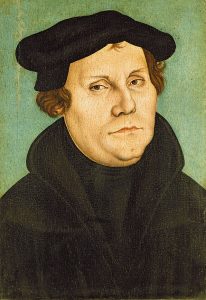3 Chapter 3: Christianity
Introduction
Christianity is the world’s largest religion, with a vast following of approximately 2.4 billion adherents, spanning across the globe. As a monotheistic religion, it shares a common thread with Judaism and Islam, all three believing in the existence of one all-powerful God. The Christian faith, however, is uniquely centered on the life, death, and resurrection of Jesus Christ in the 1st century Common Era. This pivotal event is revered by Christians as the culmination of God’s plan for humanity’s salvation.
One of the most striking aspects of Christianity is its widespread presence, with followers practicing their faith on every continent, making it the most geographically diffuse of the world’s religions. From the bustling megachurches of North America to the vibrant parishes of Africa, from the ancient cathedrals of Europe to the thriving congregations of Asia, Christianity’s global reach is a testament to its enduring appeal and adaptability. With its diverse expressions, rich traditions, and profound impact on art, culture, and society, Christianity continues to shape the lives of billions, leaving an indelible mark on human history.
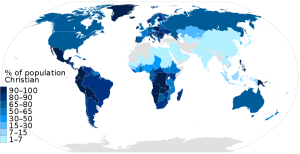
In this chapter, we will learn about the history and development of Christianity, exploring its origins, key beliefs, and practices. We will examine the life and teachings of Jesus Christ, the role of the Bible, and the significance of sacraments and rituals. We will also discuss the various denominations and interpretations within Christianity, from Catholicism and Orthodoxy to Protestantism and Evangelicalism. Additionally, we will explore Christianity’s impact on art, literature, music, and culture, as well as its influence on social justice, morality, and ethics.
Questions to Consider as you read this Chapter
-
What are the core beliefs of Christianity, and how do they shape the daily lives of adherents?
- How do Christians understand the concept of salvation, and what role do faith, works, and grace play in achieving it?
-
How has Christianity evolved over time, and what role have key figures and events played in its development?
-
What is the significance of the Bible in Christianity, and how is it interpreted and used in different traditions?
-
How do various Christian denominations differ in their beliefs and practices, and what commonalities unite them?
-
What role has Christianity played in shaping Western culture and society, and how has it influenced art, literature, and morality?
-
How does Christianity address issues like social justice, compassion, and forgiveness, and what impact has it had on promoting positive change in the world?
The Origins of Christianity: The Gospels and New Testament
Christianity has its roots in Judaism, and Jewish disciples of Jesus, who was himself a Jew, founded the religion. Christians believe that Jesus is the long-awaited Jewish Messiah. The foundational texts of Christianity are the four Gospels: Matthew, Mark, Luke, and John. These books were written after Jesus’ death, and while we don’t know the exact authors, scholars agree that they are composite documents based on both written and oral traditions.
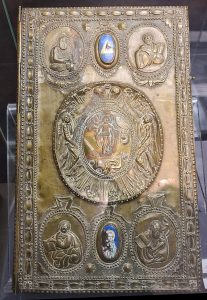
The synoptic Gospels – Matthew, Mark, and Luke – share a similar pattern, with some variations. They follow a basic structure: the miraculous conception and virgin birth of Jesus; his early ministry of preaching, teaching, and healing; increasing tension and conflict with the Jewish religious establishment; the betrayal of Jesus and his execution; and his resurrection from the dead. Within this framework, various sermons, miracles, and parables are presented. Most scholars believe that Mark’s Gospel was written first (around 70 CE) and was a source document for Matthew’s and Luke’s Gospels, which would explain their similarities.
John’s Gospel (written in the 90s CE) follows a different format, emphasizing Jesus’ teachings, particularly in the context of Jewish feasts. While the synoptic Gospels focus on Jesus’ actions, John highlights Jesus’ teachings through seven major discourses or sermons.
The Gospels are the first four books of the New Testament, but the remaining books are also crucial to Christians. The book of Acts records the history of the early Christian church, from Jesus’ Resurrection to the late 60s CE, with a focus on Peter and Paul and the spread of Christianity throughout Asia Minor.
The New Testament also includes 21 Epistles (letters) written by various early Christian leaders, including the Apostle Paul, who wrote seven of them. These letters offer guidance, encouragement, and advice to churches and individuals, presenting a comprehensive Christian theology.
Finally, the book of Revelation, or the Apocalypse, is a collection of visions received by John while in exile on the island of Patmos around 90 CE. Due to its figurative language, the book is cryptic and open to interpretation, with many different understandings among Christians.
Historical Development of Christianity
Christianity began when the New Testament was being written and is known as the Apostolic Era. The Apostolic Era extends from the early 50s CE to the beginning of the 2nd century CE. The time immediately after the death of the apostles is known as the Patristic Era. During the Patristic Era, the immediate followers of the apostles lived and taught. During this time, Roman persecution of the church was uncommon but did happen. Christians were sometimes seen to be a threat to the Roman Empire because they would not acknowledge the deity of the emperor. The Patristic Era ended with the Council of Chalcedon in 451 CE.
During medieval times (from roughly the 5th century to the early 1500s CE), the church became a major political force on the world stage. The kings of most European nations paid homage to the Pope, who resided in Rome, and many decisions of state required the blessing of the church. Most people were illiterate during these times, and the authority of the church was seldom questioned. The church became corrupt and often violent. Through a series of Crusades, the church waged war on Muslims in the Middle East and on various dissenting groups in Europe in the 11th, 12th, and 13th centuries. Persecution of Jews was rampant as well.
Firstly, the Bible was made accessible to the common people in their native language, a practice now widely encouraged within Christianity. Secondly, various churches emerged from the Protestant Reformation, including Lutherans, Presbyterians, Anglicans, Baptists, and many others. Thirdly, the Roman Catholic Church underwent significant reforms, known as the Counter Reformation, in response to Protestant criticisms.
Today, there are three main traditions with Christianity: Protestantism, Roman Catholicism, and Orthodoxy. The Roman Catholic Church has been the dominant church in the West. In the East, most Christians have belonged to the Orthodox Church. Protestant Christianity, which consists of thousands of denominations, grew out of the Roman Catholic tradition in the 16th century.
What Christians Believe (Solutions to the Problem of Sin)
Like Jews and Muslims, Christians believe that there is only one true God. However, where they different from the traditional monotheism of Judaism and Islam is that while Christians believe in one God, they believe that there are three persons within the Godhead: the Father, the Son, and the Holy Spirit. God the Father is Yahweh of the Old Testament. God the Son is Jesus Christ, the Messiah. God the Holy Spirit is the active power of the Father and Son. According to Christian teaching, these are not three gods, but one God whose nature consists of three distinct persons. This is referred to as the mystery of the Trinity. (The picture below is a famous Russian Orthodox icon of the “Holy Trinity.”)
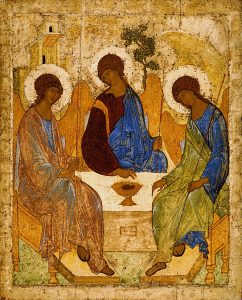
Christians believe that the single greatest problem in the universe is that humans are alienated from God because of their sins. Christians believe that sin is a universal problem and that the inability of human beings to rise above sin (to be as loving, humble, generous, and righteous as they should be) suggests that something has gone wrong deep within human nature. In the Christian view, since human beings cannot overcome sin on their own, they stand in need of salvation from its power over them.
Thus, for Christians, the problem of sin is solved by the good news of God’s grace, the love God gives freely to human beings despite their sin. In the Christian view, it is only through reliance on divine grace that salvation from sin becomes possible. Christians believe that Jesus is the supreme proof of God’s love – and that those who respond in faith by opening themselves up to his love are both forgiven of their wrong-doings and given power to overcome the power of sin in their lives.
In Christianity, the most theologically significant moment in history was the Resurrection. The Gospels record that Jesus was crucified (i.e., executed) and that he was buried in a tomb. On the third day after his death, he was resurrected to life, and his body was raised up again. He continued to live among his disciples for 50 days. While meeting with them on the Mount of Olives outside Jerusalem, he ascended, visibly, into Heaven. Christians believe that Jesus is in Heaven today and that he will one day return to earth to gather those who believe in him and then judge the deeds of all people.
These beliefs are summarized in the Apostle’s Creed, an ancient confession of faith that the Christian church has accepted widely. This basic confession of faith is recited in churches throughout the world each Sunday. Here is one version:
I believe in God, the Father Almighty, maker of heaven and earth.
And in Jesus Christ, his only Son, our Lord, who was conceived by the Holy Spirit,
and born of the virgin Mary, suffered under Pontius Pilate,
was crucified, died and was buried. He descended into hell.
On the third day He rose again from the dead.
He ascended into heaven
and sits at the right hand of the Father.
From thence He will come to judge the living and the dead. I believe in the Holy Spirit,
the Holy catholic [“universal”] Church, the communion of saints,
the forgiveness of sins, the resurrection of the body, and the life everlasting. Amen.
What Christians Practice (Solutions to the Problem of Sin)
Christianity arose from Judaism. Jesus was a Jew who preached and taught among the Jews; therefore, any understanding of Christian ethics must begin with Christianity’s Jewish roots. Jewish ethics are based on obedience to the Law of Moses. Jesus’s moral teaching, however, is not based on the law as interpreted through the larger moral imperative to love both God and humanity.
Jesus’s most detailed moral teachings in the Gospels are found in the Sermon on the Mount (as found in Matthew 5-7). In the Sermon on the Mount, Jesus taught that morality is not merely a matter of keeping the law—it also is a matter of honoring the spirit of the law in one’s heart. The following are excerpts from Jesus’s sermon:
You have heard that it was said to the people long ago, “Do not murder, and anyone who murders will be subject to judgment.” But I tell you that anyone who is angry with his brother will be subject to judgment.
You have heard that it was said, “Do not commit adultery.” But I tell you that anyone who looks at a woman lustfully has already committed adultery with her in his heart.
You have heard that it was said, “Eye for eye, and tooth for tooth.” But I tell you, do not resist an evil person. If someone strikes you on the right cheek, turn to him the other also.
You have heard that it was said, “Love your neighbor and hate your enemy.” But I tell you: Love your enemies and pray for those who persecute you, that you may be sons of your Father in heaven. He causes his sun to rise on the evil and the good, and sends rain on the righteous and the unrighteous. If you love those who love you, what reward will you get? Are not even the tax collectors doing that? And if you greet only your brothers, what are you doing more than others? Do not even pagans do that? Be perfect, therefore, as your heavenly Father is perfect.
Jesus taught that if a person lives a life of love for God and for other people, then this person fulfills the requirements of the Law of Moses. The Gospels record that a Jewish legal scholar once asked Jesus which of the many Old Testament commandments was the most important. Jesus answered: “Love the Lord your God with all your heart and with all your soul and with all your mind. This is the first and greatest commandment. And the second is like it: Love your neighbor as yourself. All the Law and the Prophets hang on these two commandments.”
The Christian ethic is an ethic of love for God and for others. Like Judaism, Christian ethics is deontological. All Christians recognize the 10 Commandments as the basis for ethical behavior. Each Christian tradition has its own set of rules and requirements as well. In the Roman Catholic and Eastern Orthodox tradition, there are sacraments in which believers participate in order to obtain divine grace. The most important of these are baptism, communion (also known as the Eucharist and the Mass), and penance (or confession). All Christians believe that community is important and emphasize the importance of Sunday worship. They also encourage believers to be generous with their time and finances. All Christians encourage believers to pray daily. Protestants also stress the importance of daily Bible reading.
Sacred Texts in Christianity
Christianity recognizes a number of sacred texts, but none take priority over the New Testament. Christians recognize the Jewish Bible as a holy book. Because Christianity is believed (by Christians) to be the fulfillment of Judaism, the patriarchs, prophets, and poets of the Hebrew Bible are seen as relevant to the Christian religion. Christians believe that Jesus fulfilled prophecies about the Messiah found in the Hebrew Bible. Christians refer to the Hebrew Bible as the “Old Testament.”
Today Christians have a broad range of opinion on the character of the Bible. Some Christians credit the authors of the Biblical texts for their spiritual insights and leave or no room for divine influence. Others downplay the human contribution to scripture, some to the point of attributing every word and idea to God. Some Christians (most notably Roman Catholics, Orthodox, and Mainstream Protestants) believe that the Bible can be trusted as true when it speaks of faith issues but contains insignificant errors relating to history and geography. Other Christians (most notably Evangelical Protestants) believe that the Bible does not contain any type of error – either doctrinal or factual.
Another type of sacred text in Christianity is papal literature. Christianity spread quickly from Jerusalem to the surrounding world in the decades after the death and Resurrection of Jesus during the Apostolic era. One of the major centers of Christianity was Rome, where the apostle Peter was the leader of the church. Since Peter’s death, many Christians viewed the church in Rome as the preeminent church and its pastor, or bishop, as the leader of the Christian faith. Over time, this belief evolved into what became known as the Roman Catholic Church. One hallmark of Roman Catholicism is a belief in the authority of the Pope, or Bishop of Rome. Because of the authority of the Pope, most Roman Catholics view papal bulls, or pronouncements from the Pope, as sacred and authoritative.
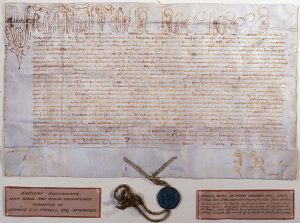
One other type of literature has emerged as sacred among Christians: devotional literature. Devotional literature consists of books, poems, and songs written to lead Christians to a deeper experience with God. A standard canon of devotional literature does not exist; rather, groups of Christians tend to select devotional literature that speaks to their situation and theological perspective. Devotional literature differs from theological texts in that the former is not written simply to teach the tenets of Christianity; devotional literature documents how a person may relate more deeply and meaningfully with God through Jesus. Topics of devotional literature often include prayer, suffering, worship, poverty and wealth, and ethics.
Sacred People in Christianity
The most sacred person in Christianity is Jesus. Christians believe that Jesus is sacred because he is God and man in one person. Christians also believe that Jesus is sacred because he lived a perfect life, having never sinned.
Many Christians also believe that martyrs form a class of sacred people. Martyrs are people who have died for their religious convictions. The veneration of martyrs has origins in New Testament Christianity. In the book of Acts, Stephen is martyred for his faith in Jesus and is seen being received into Heaven. The book of Revelation promises blessings for those who “overcame him [the antichrist] by the blood of the Lamb and by the word of their testimony; they did not love their lives so much as to shrink from death.”
Some Christians venerate saints, people who are believed to have lived particularly devout and holy lives. In the Roman Catholic Church, a person must meet specific criteria for recognition as a saint. The sainthood process includes an examination of the person’s character and doctrinal purity, the performance of a miracle, or death as a martyr. Other Christians, especially Evangelicals, would argue that everyone who believes in Jesus is a saint and that individuals may be admired as role models but should not be venerated.
Though not human, angels are another class of sacred persons in Christianity. It is believed that God created angels as his messengers and servants. In the Old and New testaments, angels are presented as human in form, blazing with a glorious light. Angels usually carry a message or fulfill a task for God. For example, in the Old Testament, an angel of death killed Israel’s enemies; in the New Testament, an angel told Mary that she would give birth to Jesus.
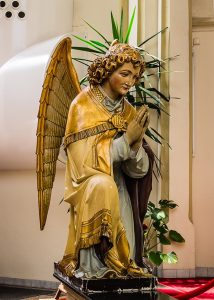
Sacred Space in Christianity
-
Special dress codes or attire required for worshipers
-
The use of incense or other sensory elements to create a sacred atmosphere
-
Observance of silence or quiet reflection before entering the sanctuary
-
Ceremonial washing or other rituals performed before entering the building
-
Restrictions on eating or other activities within the church building
-
Other practices that demonstrate respect and reverence for the space

Sacred Time and Liturgy in Christianity
Christians observe several sacred times each year. The most basic unit of sacred time is Sunday, or the Lord’s Day. Sunday is sacred to Christians because they believe that Jesus was resurrected from the dead. Sunday is observed as a day of worship and often as a day of rest.
Christianity recognizes significant life-cycle events as sacred times. Birth may be celebrated with a service of dedication during which the parents vow to raise the child as a Christian, or with baptism, a ceremony during which the child is seen as part of the Christian community. Coming-of-age rituals are marked as well. The Roman Catholic Church, and many other denominations, observe a confirmation service during which a boy or girl of about 12 years of age is confirmed as a full member of the church. This is similar to a Jewish bar mitzvah (for boys) or bat mitzvah (for girls). In Christianity, marriage is endowed with special religious significance. In the Roman Catholic and Orthodox Churches, for example, marriage is seen as a sacrament, an act that signifies the grace of God on a person. Other significant life- cycle events include ordination to the ministry or the priesthood and death.
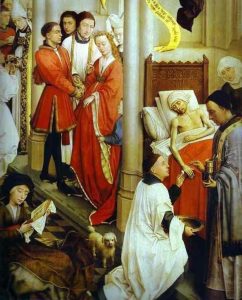
Christians also observe several holidays throughout the year. The two holidays that almost all Christians observe are Christmas and Easter. Christmas is a celebration of the birth of Jesus, while Easter commemorates the Resurrection of Jesus from the dead. Some Christians, though not all, celebrate Lent, a 6-week season leading up to Easter, and Advent, a 4-week season before Christmas. Christians in various countries also celebrate one or more national holidays and holidays for saints. All Christians however do not universally recognize these holidays. Examples of days that some Christians celebrate include Saint Patrick’s Day, Mardi Gras, and All Saint’s Day.
Many Christian groups observe a liturgy. This liturgy may be as simple as the order of events in a worship service or as detailed as a yearly calendar of biblical texts, songs, and holidays to emphasize various aspects of the Christian faith. Some Liturgies observe a 3-year cycle. No standardized liturgy applies to all Christians, and not all churches follow a liturgical plan. Roman Catholics, Orthodox and mainstream Protestant churches usually follow a liturgy; Evangelical Protestant churches usually do not.
Death and the Afterlife in Christianity
Christians believe that the choices individuals make regarding God and God’s grace in this life will have eternal consequences in the afterlife. These consequences are often symbolized as heaven and hell, representing two vastly different destinies. Some Christians also believe in purgatory, a transitional state between earthly life and heavenly union.
In Christian tradition, heaven represents the ultimate union with God, the fulfillment of humanity’s deepest desires and purposes. Whether understood as a literal paradise or a state of being, heaven embodies the infinite joy of eternal existence in God’s loving presence. It is a realm of perfect love, peace, and harmony, where believers will experience the fullness of God’s glory.
On the other hand, many Christians believe that hell is not so much a punishment inflicted by God, but rather the self-imposed consequence of rejecting God’s love and grace through the exercise of human free will. The nature of hell is a topic of debate among Christians, with some believing it to be a literal place of suffering and others interpreting it as a symbolic representation of spiritual separation from God. A minority of Christians do not believe in the existence of hell, instead emphasizing God’s universal love and redemption.
It’s important to note that Christian beliefs about the afterlife vary widely, and not all Christians agree on the specifics of heaven, hell, and purgatory. However, the core belief in the consequences of human choices and the ultimate union with God remains a central tenet of Christian theology.
Christianity in Society, Community, and State
Christianity has had a profound influence on Western society and government since its inception. During the Middle Ages, the Roman Catholic Church wielded significant power over European rulers, shaping political and social structures. Following the Protestant Reformation, various Protestant churches gained influence in numerous European cities, further diversifying Christianity’s impact.
In the United States, Christianity played a pivotal role in the country’s founding, as pilgrims seeking religious freedom colonized the New World. Baptists, Quakers, and Catholics were among the first to arrive, seeking to practice their faith without persecution. The Declaration of Independence, drafted in 1776, enshrined the religious principle that humans are “endowed by their Creator with certain unalienable Rights,” including life, liberty, and the pursuit of happiness.
Christianity continued to shape American culture and society, with religious leaders playing key roles in civic and cultural life. Notable examples include Dr. Martin Luther King, Jr., who led the civil rights movement; Norman Vincent Peale, a prominent author and minister; the Rev. Dr. Peter Marshall, who served as chaplain of the U.S. Senate twice; and the Rev. Billy Graham, a renowned preacher who advised every U.S. president from Harry Truman to Barack Obama.
Many U.S. presidents have professed Christianity, and its influence extends to various legal debates, such as those surrounding same-sex marriage and abortion. Christianity’s impact on American society and government remains significant, with its values and principles continuing to shape the country’s moral and ethical fabric.
Chapter Review
To learn more and review the key concepts presented in this chapter, watch:
- Crash Course Religions: The Story of Christianity
Glossary
95 Theses: A list of grievances Martin Luther raised against the Roman Catholic Church on October 31, 1517, which prompted the beginning of the Protestant Reformation.
Acts of the Apostles: A book in the New Testament that records the history of the early church after the Resurrection of Jesus.
Angel: A supernatural messenger and servant of God.
Apocalypse: A cryptic book in the New Testament that the apostle John wrote; presents prophecies about the end of time and the return of Jesus.
Apostle: In Christianity, one of the original 12 followers of Jesus who spoke with the authority of God to the church.
Apostolic era: The years of approximately 33 CE to the 2nd century CE; period in the history of the Christian church when the original followers of Jesus, the apostles, were alive.
Canon: Literally, “rule” or “measure”; set of books, usually referring to the Old and New testaments of the Bible, that the church has agreed are sacred and authoritative.
Christmas: A holiday celebrated on December 25 of each year, commemorating the birth of Jesus.
Crusades: A series of military campaigns that European and British kings led and performed under the auspices of the Pope against Muslim armies for possession of Jerusalem and other key biblical landmarks.
Easter: A Christian holiday that commemorates the Resurrection of Jesus.
Epistle: In the New Testament, a letter written from an apostle to a person or group of people, outlining doctrine or addressing specific problems.
Evangelical: A Christian who emphasizes a literal interpretation of the Bible and personal holiness.
Godhead: The Christian term for God when considered in his fullness (i.e., Father, Son, and Holy Spirit).
Gospels: The first four books of the New Testament that detail the life and teachings of Jesus.
Hypostatic union: The Christian doctrine that in Jesus, God and humanity are united perfectly.
Incarnation: Literally, “taking on flesh”; in Christianity, refers to the virgin birth of Jesus to Mary, resulting in a person who is both God and human.
Indulgences: Papers that the Roman Catholic Church sold and which supposedly reduced the suffering of loved ones who had died and allowed them to reach Heaven sooner.
Inerrancy: The belief that the Bible, as written, is perfect and true and without errors.
Liturgy: A formal order of worship; the order of events in a specific Christian worship service; an entire year of planning for sermons, singing, and teaching in the church.
Mainstream Christian: Protestant Christian who tends to emphasize tradition and religious structure.
Martyr: A person who willingly dies for his or her religious convictions.
Mystery: In Christian theology, a doctrine that is accepted as true, though it is beyond the scope of reason and cannot be understood or explained rationally.
Natural revelation: In Christianity, the idea that God has revealed himself through the orderly creation of the universe and the conscience of each individual.
Papal bull: A pronouncement from the Pope that establishes Roman Catholic doctrine or practice.
Parable: A story with a hidden meaning; a primary teaching method of Jesus.
Patristic era: The period from 100 to 451 CE when the Church fathers, or students of the apostles, were alive.
Pope: Literally, “father”; title given to the bishop of the church in Rome; head of the Roman Catholic Church.
Protestant Reformation: A movement that Martin Luther began in 1517 and which led to the development of Protestant churches.
Resurrection: Christians believe that after Jesus died, he was buried and was raised to life on the third day after his death.
Revelation: See Apocalypse.
Roman Catholic Church: A Christian tradition that dates back to the church in Rome during the Apostolic era and which claims to continue the lineage of the apostle Peter’s ministry.
Sacrament: An event that represents the grace of God in a person’s life.
Saint: A Christian who has been recognized as living a particularly devout and holy life.
Sermon on the Mount: One of Jesus’s most protracted and significant sermons.
Sin: An act of unrighteousness or a breaking of God’s laws that places a barrier between God and the one committing the sin.
Synoptic: Literally, “looks the same”; presenting or taking a common view; of or relating to the first three Gospels of the New Testament.
Synoptic Gospels: The three Gospels in the New Testament (i.e., Matthew, Mark, and Luke) that share a similar structure and content.
Trinity: The Christian doctrine that God consists of three persons in one: Father, Son, and Holy Spirit.
